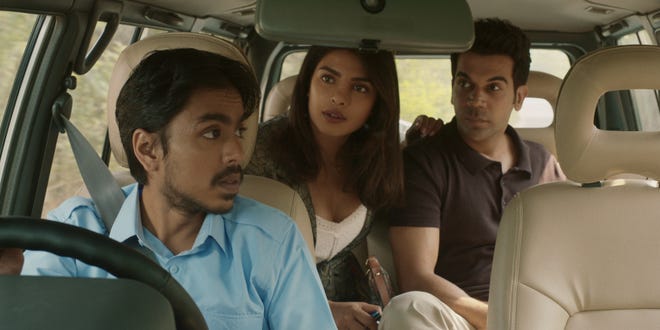Who is this shifty sociopath? He goes by the name of Balram (and is played by newcomer Adarsh Gourav), though even this has the air of an alias, and Bahrani introduces him to us several times over. In the Delhi of 2007, he presents as the meek young chauffeur to a Westernised power couple (Rajkummar Rao and Priyanka Chopra Jonas). In the Bangalore of 2010, he shapes up as a self-made entrepreneur with obligatory, Chabuddy G-style ponytail. A flashback fills us in as to his schooling in rural poverty; somewhere along the line, we even get a glimpse of Balram's image on a missing-persons poster. This will be one of the film's most effective tactics. Only belatedly is its bumfluffed blank of a central character allowed to snap into full focus; for much of the running time, we're monitoring him as he reconfigures himself between states, like water wavering between vapour and ice. Balram operates at a similar temperature, it transpires. At face value, an extension of the many dirt-poor grafters in the Bahrani back catalogue (Man Push Cart, Goodbye Solo, 99 Homes), he's distinguished from that opening bout of narration by his heightened awareness of his place in the pecking order ("the rooster cage", as he calls it, throwing back to his childhood) and his willingness to do anything - no scruples, no limits, no red lines - to get ahead. Does that make him representative of modern India? You be the ref.
A more conclusive discussion may be what The White Tiger has to say about Ramin Bahrani. I liked his earlier films as much as anyone - okay, maybe not as much as Ebert - but they could never be mistaken for crowdpleasers. (When he set out to court middle America with 2012's Zac Efron-starring NASCAR drama At Any Price, its R rating - an 18 in the UK, the consequence of a stray pornographic image - immediately decimated its commercial prospects.) Here, armed with Netflix funding and proven material, he turns a corner in his career and engages in some shapeshifting of his own: this will, I suspect, be Bahrani's most watched film by a country mile. Watch The White Tiger in a double-bill with Netflix's other recent, Delhi-set acquisition, Prateek Vats' Eeb Allay Ooo!, and it'll only underline how the rigorous social realism of Bahrani's earlier work has given way to something slicker: star faces, soundtrack cues from the blingier end of hip-hop, a snappy pace. Some doubts may follow from that. (At the very least, we're given pause to wonder if Netflix money might convert even Ken Loach into Chris Columbus.) Yet Bahrani makes such smart, rewarding choices that you'd have to be a real grouch to begrudge him this success.
For starters, The White Tiger has been very astutely cast, not just from a commercial perspective, but for how much personality it gets into each scene. Rao and Chopra Jonas, major Bollywood stars both, have the couple's floaty, champagne-bubble privilege down pat, but also sketch some internal power dynamic, him far weaker than her. And Gourav is convincingly bristling, which becomes ever more important as that bumfluff grows out into a rake's moustache, and a revenge plot starts to take shape. At almost every turn, his Balram is smarter than anybody around him cares to believe, and Gourav nimbly negotiates the narration that serves as a holdover from the book: if the film messes with us, it's largely the result of this performance, how this young man plays us, too, for suckers. That's another sign of Bahrani's influence: whatever mode he happens to be working in (and however much money he's now getting to play with), he's emerged as a remarkably assured storyteller. Note how he constructs the final shot to suggest what's been left behind in his protagonist's wake; even the curious structural wrinkle of giving us some of the middle and the end at the beginning adds to our sense that everything and everyone in this story is jostling for position.
Is that where my colleagues got their ideas from? The film shows us an India in a state of constant motion and agitation, such that each moment holds the prospect of efflorescence and/or explosion, depending on which way the money goes round. Maybe I'm falling into Balram's trap now, over-extrapolating from this one, notably extreme Indian life. (The title, after all, refers to a once-in-a-generation predator.) The thought struck me that the hyper-accelerated pace of the world in general, and of Indian development in particular, may have left the country Adiga was writing about back in the Noughties for dust; that to critics and viewers living in the India of farmers' protests and Disha Ravi, Bahrani's film may already have the look of a quaint period piece. (Imagine, my Western friends, a movie claimed as representing "modern Britain" that doesn't venture beyond the year 2010 chronologically.) In the end, perhaps The White Tiger says no more nor less about modern India than Kind Hearts and Coronets did about the Britain of 1949, or The Talented Mr. Ripley did about post-War America and Europe. There are doubtless a few truths about human nature tucked away in there, and a fine evening's entertainment besides, but you'd be a fool to take such a skilfully slippery piece of work so completely at its word.
The White Tiger is now streaming via Netflix.

No comments:
Post a Comment